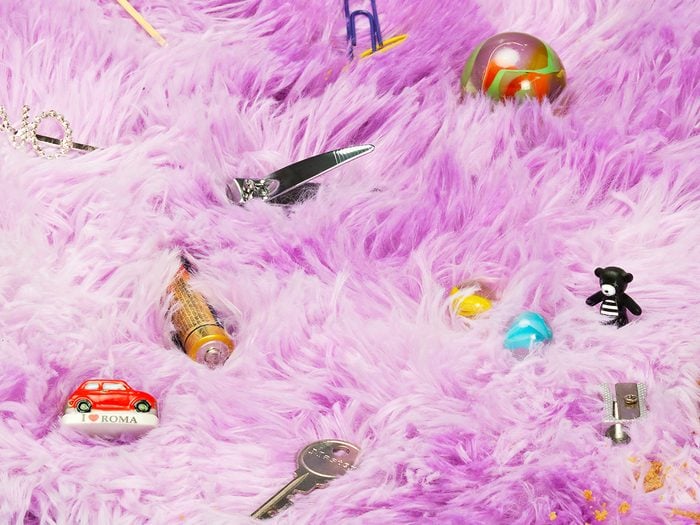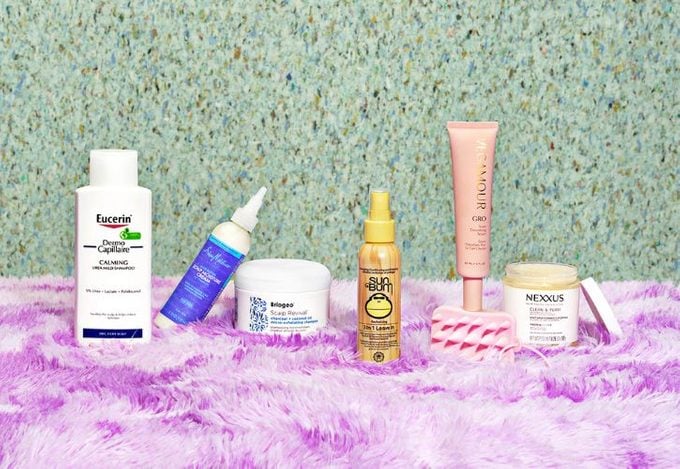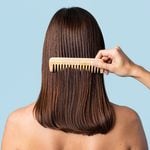What to Know About Scalp Health, According to Experts

Scalp facials, scalp serums, scalp brushes—here's why scalp-care is currently trending.
I’m sitting in a plush chair while a woman presses a tiny camera wand against my scalp. On a screen in front of me, I see my pores magnified 200 times. “Your scalp requires a good exfoliation and extraction,” says the woman with the camera, a scalp therapist at a Toronto salon. I spy a bunch of flakes (dandruff) and filmy white coating (product buildup), and find the idea of whisking it all away to be oddly satisfying, like how I feel about pimple-popping or earwax-removal videos. But that’s not the only reason I’m here. I’m here to manage the itching, irritation and flaking that comes with an eczema flareup by getting a scalp facial—this salon’s specialty.
(Related: What’s a Scalp Serum and Do I Need One?)
What are scalp facials?
Scalp facials, which involve a microanalysis of your scalp and a professional cleansing and exfoliation, are one of the buzziest beauty trends on TikTok. The hashtag has more than 30 million views, with a slew of enticing videos that show users how rejuvenating and relaxing a head massage, thorough scrub and other scalp-focused treatments can be.
Videos also show users sharing the benefits of scalp facials, claiming they can foster healthier manes. In response to the growing interest in treating hair issues at the root cause (pun intended), a plethora of specialized scalp products have inundated the market, ranging from soothing serums and exfoliating scrubs to nourishing oils and revitalizing tonics. The global scalp-care market is projected to have a compound annual growth rate of 7 percent by 2030, with the majority of customers who are interested in these products sharing the same concerns I have: dandruff and a dry and itchy scalp.
The scalp facialist at my treatment tells me that my scalp lacks moisture and advises me to increase my water intake, which makes sense. I’ve just taken a long round-trip flight, and air travel’s notorious for sucking every drop of moisture out of your skin. “There’s also some redness, which tells me your pores are slightly inflamed,” the facialist says. In other words, my hair follicles are clogged with oil and dry skin, and are therefore more prone to scalp issues, like irritation. The comment checks out since I have eczema, which often comes with dryness and dandruff.
Why scalp health matters
According to Montreal-based dermatologist Roni Munk, our scalp is a clear marker of our health and well-being. “Scalp conditions like dandruff or excessive dryness may suggest underlying issues such as stress or hormonal imbalances,” he says. A well-maintained scalp promotes good blood circulation, which can reduce stress and boost relaxation. “This is one of the reasons scalp massages are so popular,” says Munk. Another reason is that they help balance sebum, your scalp’s natural lubrication—which is more important than you might think. Munk says low sebum production can lead to a dry, flaky and irritated scalp, while excessive sebum production can clog pores and cause hair thinning.
Matthew Collins, a celebrity hairstylist and global ambassador for Dyson, agrees. “Everything starts with a healthy scalp,” he says. “In my experience, dry scalp problems are most noticeable around the hairline, spanning roughly an inch in all directions, including the nape of the neck.” This, Collins explains, can be caused by beauty product buildup, sweat or even tension from tight hairstyles. He recommends applying a scalp serum to this area to hydrate the skin and calm the inflammation. He also suggests using a scalp massager before showering, which can help remove dry skin and product buildup, just like a scalp facial.
After the microanalysis of my scalp, the therapist starts the treatment. She gives me a neck and scalp massage, then performs galvanic stimulation therapy. This step involves a small tool that’s meant to provide electric stimulation to my scalp. The idea is that low electric currents will make it easier to remove buildup and dead skin cells through the shampoo process that follows.
Next, the therapist places a cap on my head to steam my scalp, then applies a hydrating serum with a brush to massage it in. My scalp immediately feels hydrated and somehow lighter. The therapist brings back the microscopic camera for a before-and-after analysis, and I can see that my scalp looks significantly cleaner. There’s a reduction in flakes and the filmy buildup is gone.
The truth about scalp facials
But here’s the thing: Although Munk agrees that a microscopic analysis can be a valuable tool for identifying scalp woes, he also says the findings should be interpreted only by professionals like dermatologists or trichologists, who have deep knowledge of scalp conditions and can offer the most effective treatment options. Otherwise, it could be a waste of money. (Scalp facials will set you back about $120.)
In the end, Munk was right: The benefits of my scalp facial are short-lived. That light and hydrated feeling lasts just a day or two. Would I do it again? Although it was undeniably relaxing, I’d rather spend my money on an at-home scalp treatment that I can do each week, and take my scalp health into my own hands—and my dermatologist’s.

5 Scalp-Care Product Picks
Sun Bum Scalp and Hair Mist SPF 30
The skin on your scalp is susceptible to sun damage, but (admit it!) it rarely gets proper protection. This mist can be sprayed directly onto your hair and exposed scalp to offer SPF coverage. It’s lightweight and quick-drying, so your hair won’t feel greasy—and will maintain its volume, too.
$21, well.ca
Vegamour GRO Scalp Detoxifying Serum
This weekly treatment is made with plant-based ingredients that work to reduce dandruff symptoms in as few as three days after initial use. The serum’s star ingredient, willowherb, helps remove flaky skin while creating a healthy scalp microbiome, while zinc PCA absorbs excess oil and buildup to keep your mane looking fresh.
$57, sephora.com
Eucerin DermoCapillaire Calming Urea Shampoo
Have a dry and itchy scalp? This mild shampoo, recommended by the National Eczema Society, gently cleanses and moisturizes to help reduce redness and irritation.
$25, lookfantastic.ca
Sephora Collection Silicone Scalp Massager
This curved, millennial-pink massager fits neatly in the palm of your hand to help dislodge product buildup, loosen flakes and better distribute any sort of scalp treatment. Its nubby silicone bristles can be used on wet or dry hair—and feel particularly blissful on the base of your skull.
$16, sephora.com
Briogeo Charcoal + Coconut Oil, Micro-Exfoliating Shampoo (Mini)
Made with a trio of coconut, tea tree and mint oils, this weekly shampoo treatment helps get rid of dandruff while also soothing and moisturizing a dry scalp.
$21, sephora.com
Nexxus Clean & Pure Scalp Scrub
Just like with your skincare routine, an exfoliating scrub is the best way to remove your scalp’s dead skin cells, which can lead to dull, rough and dry skin. This one is made without parabens, dyes or silicone, making it perfect for those who prefer gentler products.
$19, amazon.ca
Aloe Butter Scalp Moisture Cream
This leave-in cream is formulated with a special superstar ingredient: aloe butter. It helps alleviate pesky dry skin symptoms like tightness, itchiness and irritation and will leave your scalp feeling soothed and hydrated all day long.
$15, shoppersdrugmart.com




